When we speak of history books normally we refer to non-fiction. But, what of fiction? There is a definite place for novels in our understanding of the Revolutionary War. A good, I stress “good,” historical novel puts flesh on the bones of facts. And, they can be a fun read. They also attract many people to history that a non-fiction book would not. I for one read a lot of historical fiction when I was young… and have never regretted that it led me to a lifetime enjoying history.
Now, I read few historical novels but there are some that I have enjoyed time and time again. They’re more than a good read. They’re history alive. Here is my top 10 Revolutionary War novels in no particular order.
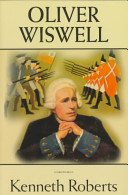 Oliver Wiswell – Kenneth Roberts, 1940.
Oliver Wiswell – Kenneth Roberts, 1940.
This book may well be the best historical novel of the Revolutionary War.
We Americans, when reflecting on the Revolutionary War, often tend to think of ourselves as kindred spirits with the revolutionaries. We remember the Patriots who threw off the yolk of British oppression as the good guys. The British, the Loyalists or Tories, those who remained true to the King, are the bad guys.
The world however, is never quite so black and white as this. Historian Kenneth Roberts, and he is an historian not just a novelist, turns the tables on our ingrained sense of good and bad, right and wrong.
The hero of the story, Oliver Wiswell, is a very compelling and sympathetic character. The reader immediately likes Wiswell and finds himself agreeing with Wiswell’s thoughts and actions as being entirely reasonable and sensible. But,….and here’s the rub, Wiswell is a Tory. This plays tricks on our preconceived notions of who is right and who is wrong. In Wiswell’s eyes he and those of similar loyalties are Patriots and those who fight against the established government are rebels bent on destroying all that is good in the world through Civil War.
The reader witnesses the brutality of rebel mobs as they tar and feather those whose beliefs differ from their own. Houses are ransacked, men and women are intimidated and publically humiliated. Free speech and free press are privileges only enjoyed by the rebels. The reader sees the war from the “other side.”
While the book is longer than many it reads quickly. The characters are very well developed, sometimes with a great deal of humor. The historical events and characters are easily accepted as authentically portrayed. One wishes the story did not end.
Oliver Wiswell is by itself a good historical read. With the added benefit of the convincing, if uncomfortably unsettling for many of us, Tory viewpoint it becomes essential to grasping the story of the first American Civil War; the American Revolution.
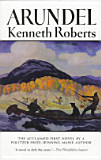
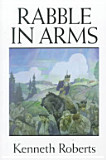 Arundel – Kenneth Roberts, 1929.
Arundel – Kenneth Roberts, 1929.
Rabble in Arms – Kenneth Roberts, 1933.
These two novels tell of the great trek made to attack Quebec and the battles in upstate New York on Lakes Champlain and George. It also describes, vividly, the real military hero, and patriot, Benedict Arnold was at that time. While not reaching the stature of Oliver Wiswell these novels are excellent in their own right.
Drums Along the Mohawk – Walter D. Edmonds, 1936.
Don’t let the date scare you away. This is an outstanding story set in the Mohawk Valley of upstate New York. The settlers, with little help from the Continentals, face off against Tories and Indians along the frontier. There, the battles of Oriskany, Ft. Stanwix, Cherry Valley and others are played out in ruthless fashion. The settlers, including women and children, could only band together small groups to defend against organized military attacks on their farms and villages. This is up close and very personal. The book was also made into an excellent film starring Henry Fonda and Claudette Colbert, directed by John Ford.
Johnny Tremain – Esther Forbes, 1945.
This is one of the most outstanding historical novels. The action takes place in Boston at the start of the Revolution. While it was written with a young adult audience in mind there is little that would be dismissed by an adult as juvenile and much that is thought provoking. The thinking behind the Sons of Liberty are well portrayed. The conflicts between Royal governance and the people of Massachusetts is spelled out very clearly. The conflicts escalate from disgruntlement, to resistance and finally to armed hostilities. This too has been made into a film in the late 1950’s which is well worth watching.
April Morning – Howard Fast, 1961.
This novel is one of my favorites and I’ve read it probably more than any other. It tells the story, over a 24 hour period, of the battles of Lexington/Concord as seen through the eyes of a 15 year old boy about to become a man. Waiting on Lexington Green in the darkness, not knowing what, if anything, will happen is very real. The tension rises as dawn nears bringing with it, out of the mists, the sound of beating drums and marching feet.
The writing is so realistic the reader finds himself standing on the green, nervously clutching his fowling piece, shifting his weight from one foot to another. With dry mouth and a knot in the stomach the redcoats are seen coming into view. In a few minutes the little band of minutemen is facing lines of soldiers, their bayonets gleaming. Officers order the citizen soldiers off the King’s Green. A shot is fired. Instantly, a ragged volley erupts from the soldiers who then charge with lowered bayonets.
The reader spends the rest of the day with the young man as he fights along the road as the British retreat to Boston. This is “you are there” writing at its very best. I highly recommend this book to anyone – young or not. The film taken from his novel is also recommended.
The Crossing – Howard Fast, 1971.
Citizen Tom Paine – Howard Fast, 1943.
The Hessian – Howard Fast, 1972.
Conceived in Liberty – Howard Fast, 1939.
While I hold April Morning in the highest regard Howard Fast’s other Revolutionary War novels are also very well done. Time spent reading these will not be wasted.
That’s my short list. Please add your comments below. Books are a very personal thing and no doubt others will have their own favorites.







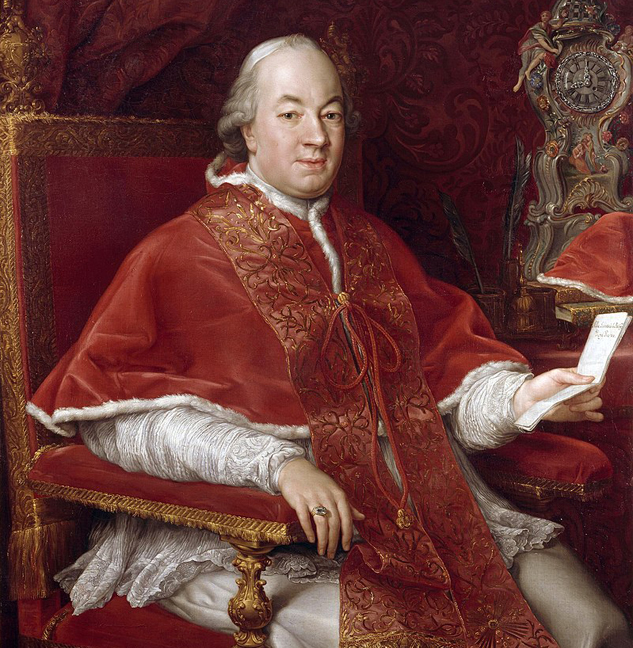
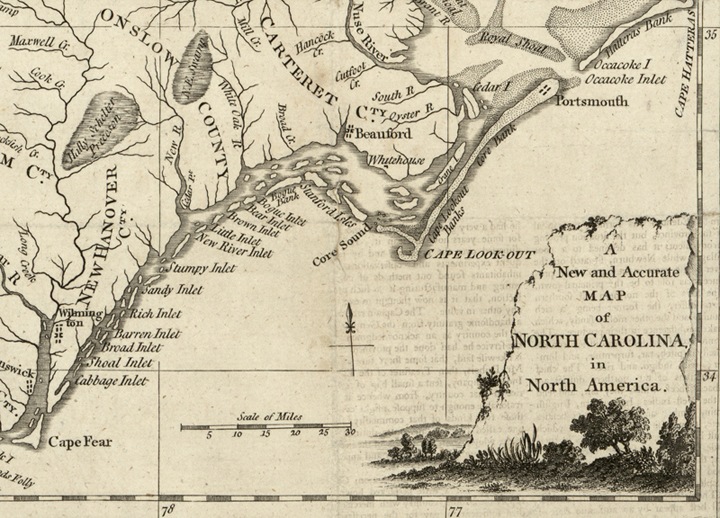

28 Comments
Have you read Jeff Shaara’s The Glorious Cause and Rise to Rebellion? They are both at the top of my list.
I agree! Written by the son of Michael Shaara of ‘The Killer Angels’ fame, Rise to Rebellion and The Glorious Cause are my two favorite Revolutionary War novels.
Mike B.
No. I’ve not read these. Thanks for the tip, will keep them in mind.
While Roberts books are great, Jeff Shaaras 2 books—Rise To Rebellion and Glorious Cause—are the best I have ever read concerning the American Revolution. Absolutely terrific! Don’t miss these. I can’t even begin to convey to you how good they are.
I couldn’t agree with you more that those historical novels are top rate. You reminded me about “Oliver Wiswell” and for a few minutes I couldn’t locate it. I thought, “Oh no. Don’t tell me I donated this book along with many other books to the library”! But, then to my relief, I found it.
Anne, I’ve done exactly the same thing….several times. Not sure if it’s a “senior moment” (my case, not yours, of course) or just my sloppy shelf management. Have even bought a book…and after reading a chapter or so thought “this seems familiar” and gone to The Shelves and found I already had the book! But, I’m a firm believer in never having enough books. Read on!
I enjoyed Kenneth Roberts’ novels, but my favorite has to be “The Overmountain Men” by Cameron Judd. A great story of the frontier during the Rev War. It inspired me when I wrote my books. It is more of the modern style of writing, an easier read than Roberts, and more exciting, too.
Gregory,
Thanks for your input. I must confess to not having read Cameron Judd.
Bernard Cornwell is best known for his “Richard Sharpe” series which take place during the Napoleonic wars. He’s written many other books, including “Redcoat,” a wonderful, largely historic, account of General Howe’s occupation of Philadelphia in 1777. Included are good descriptions of the Paoli massacre and the fighting at Germantown. He also wrote “The Fort,” about the Penobscot Expedition of 1779 in present-day Maine. He wrote about this event because it is close to where he lives, which may account for all the extra detail that make the book difficult to wade through.
Heck. Burr by Gore Vidal probably deserves mention.
I guess I’ll have to give April Morning another chance. I threw it across the room when they had Rev. Clarke telling another character, with disdain, that he wished Adams and Hancock would leave his house already. That characterization made me a little furious. But maybe I should give the book another chance just for the suspense and writing.
I have published one novel, A FOUNDER FOR ALL, about Abraham Clark, signer of the Declaration, and his experience in Congress throughout the Revolutionary War Era and afterward. He was part of many of the critical committees, including being one of the few delegates to the Annapolis Convention, and pushing for small states’ rights to equal representation and pushing for the Bill of Rights. The novel includes many authentic letters from Clark. My next novel, A PATRIOT’S PRICE, will follow Clark’s son who was held captive on the British prison ship, HMS Jersey, the most hellish of all the ships. It is in editing now. I would love to have suggestions for getting into a major publishing house and finding a good agent, as well as getting reviews from legitimate readers of the novel (not folks who will write a review for a price.) I plan on other novels on American wars. Any suggestions will be greatly appreciated.
The second half of the Outlander series by Diana Gabaldon takes place before and during the Revolutionary War. It’s truly incredible. I learned things I never knew from reading these books. And the series as a whole is great historical fiction. The first two deal with the Jacobite Uprising and the fateful Battle of Culloden. It’s a series I recommend to anyone and everyone.
Kenneth Roberts and Esther Forbes are, to me, the gold standard. The history is largely very accurate (and they did it before searchable databases!) and the stories are well-told. I read both authors as a child and can still re-read those books with interest today.
Forbes’s non-fiction PAUL REVERE AND THE WORLD HE LIVED IN, which won the Pulitzer, is still excellent. Her earlier novels are pale shades of JOHNNY TREMAIN. However all of Roberts’s novels hold up, to greater and lesser degrees, in my opinion.
As a child, I couldn’t abide Howard Fast, and I still don’t have a lot of tolerance. If you want to experience an endurance event, show the slow and painfully stilted movie APRIL MORNING to modern 7th graders. (As a teacher, I do it every year, sweating.)
I have not read Jeff Shaara, but will look for those books.
Another author and book, not mentioned, is Gwen Bristow and her CELIA GARTH. It is a “girl’s story,” set in Charleston, South Carolina, during the war. Danger, war, murder, romance. Celia is a great character and aside from the great gloss over slavery, it remains a wonderful read. If one checks reviews one will find literally hundreds of women who still love it after first reading it at age 12.
I typed so quickly that I should have added that like JOHNNY TREMAIN, CELIA GARTH is targeted to middle schoolers. It is definitely history “lite” … but still sucked in a great many of us, as one can see in the fondly reminiscent reviews.
Thomas Fleming’s wonderful LIBERTY TAVERN ought to be included on anybody’s list of best novels about the Revolution. It follows a fractious but very sympathetic New Jersey family through the thick of all eight years of continuous conflict. Completely engrossing!
The Spy: a Tale of the Neutral Ground by James Fenimore Cooper is worthy of mention. Published in 1821, it was Cooper’s second novel.
Like Selden, as a young woman growing up reading stories from a female perspective helped immensely in ushering in my life-long love of history. If you haven’t read any Ann Rinaldi yet, you should. She writes in multiple time periods, including the American Civil War, but has a large offering for the Revolutionary era. My favorites include OR GIVE ME DEATH which is told from Patrick Henry’s daughter’s perspective and HANG A THOUSAND TREES WITH RIBBONS which is about Phylis Wheatly growing up starting with her capture in Africa.
As so often on JAR I learn a great deal not only from the articles but from the superior comments from well informed fellow subscribers. I most often enjoy military and biographical non-fiction but the occasional well written fictional Rev War read is most welcomed and now I have a great list to choose from for my next library visit. Thank you one and all!
Thank you for this list. I checked out Oliver Wiswell from the local library and was floored! I was sorry to return it.
Thanks. This list led me to “Oliver Wiswell”, and after waiting a few weeks for a copy to arrive at my library, I was rewarded with a new perspective on the lives of the people who lived through these times. As I quickly plowed through it’s 900+ pages, I found myself as proud of my Loyalist ancestors as my great grandfather, who served eight long years struggling to push our British and Hessian cousins from America.
Former President Jimmy Carter has written The Hornet’s Nest, an historical novel set in the southern colonies during the Revolutionary War. I found it riveting. His characters were believable, most were authentic. Carter presented The complexities of the relationships between the colonists of different loyalties and the British occupiers, as well as the role of the native Americans. I appreciate and value this perspective that Carter provides.
Thanks for the great book ideas! Do you think “Rabble in Arms” is too much for young teens to digest? What age group would you recommend it for? Would appreciate any input.
Need to add the Seeds of America Trilogy by Laurie Halse Anderson. Slave girl during Revolution. Very moving, insightful and gives a different side of things. Love it. Young adult lit so it is a quick read.
I’m delighted to see three Kenneth Roberts books at the head of this list. I discovered his books during the 1950s as a teenager. Robertsl hooked me on history, and I stayed hooked through college, graduate school, and up to now, my fiftieth year as a college professor!
Can anyone help me find a book – Historical fiction. I read it ,1976, 6th Grade History. It went through almost every historical event: Tea party, Paul Revere, the federalist – was a great book! Thank you.
Donna – You are probably remembering Johnny Tremain. I read it in 8th grade, and it was start of my passion for history.
“Israel Potter: His Fifty Years of Exile” (1854) by Herman Melville.
It’s not “Moby Dick, ” but a minor book by a great writer. Nevertheless, it is an amusing and original take on the Revolutionary period. Though fictional, it was based on the account of a real life Yankee who fought at Bunker Hill and was later captured by the Royal Navy.